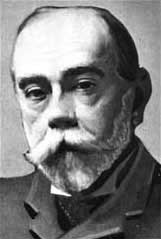

| THE LIFE AND CHESS OF PAUL MORPHY Morphy from Life and Letters of Edwin Lawrence Godkin |

October 2, 1831 - May 21, 1902
Life and Letters of Edwin Lawrence Godkin. Volume: 1
JUNE 22, 1859 The latest bit of excitement we have enjoyed has been caused by the reception of Mr. Paul Morphy, the chess champion. The Chess Club of this city has presented him with a set of gold and silver chessmen and a gold watch of American manufacture, accompanied, as is usual in such cases, by two "orations," containing sketches of the history of chess from the earliest times to the present moment, besides divers prophecies upon the future greatness of this great country, and a great deal of self-gratulation as to her past exploits. He has since gone to Boston, and has there received still greater glorification at a banquet, at which all the leading literary, legal, and social luminaries were present, Dr. Wendell Holmes reading a poem composed especially for the occasion. On all these occasions Morphy's skill in the noble game has been unhesitatingly declared by the speakers to indicate the possession of the highest order of intellect, and general fitness to attain the topmost place in any position in life. Morphy has, however, had the tact and good sense to see the absurdity of these eulogies, and to parry them by constant reminders that chess is after all but an amusement, and can never be anything but an amusement, and that it ought never to be placed in the same rank with the more serious pursuits of life. As is usual, the reaction set in in a few days, and every one who took part in these demonstrations is now more or less ashamed of them, and trying to shift the blame on some one else. The whole thing furnishes one more illustration of the curious mixture of rough English common sense and French excitability which enters into the American character. There seems to be pent up in the bosom of the public a supply of frantic enthusiasm which is constantly on the verge of explosion, and which does explode whenever it gets any reasonable excuse. No people was ever so devoured by that sort of hero-worship which expends itself in speeches, processions, fireworks, and poetry. There is a constant craving in the breasts of the inhabitants of the large cities, and particularly of New York, for a great somebody to fondle and eulogize, and when they get hold of a celebrity, no matter how small, they never think of proportioning their praise to his deserts. Every one of them, whether he began to work at early morn or at the eleventh hour, receives precisely the same wages as the rest, and that at the highest rate that the powers of language will admit of. When Kossuth came and Jenny Lind came, the excitement was of the maddest kind, and you may remember the wild extravagancies that were committed in their honor. No other opportunity for an outbreak on so grand a scale offered itself until the Atlantic cable was laid, and then the tide reached a higher point than it had ever attained before. Cyrus Field was seized on as the specific object of the outburst, and there was nothing too wild or absurd to be said in his praise. He was compared to Moses, to Alexander the Great, and Cyrus the Great. All the conquerors, philosophers, and statesmen of the world were declared to lose their lustre in comparison with his achievements. The cable had no sooner vanished into thin air, than Morphy providentially appeared on the horizon, and the enthusiasm once more rose to fever heat. The persons who expended their eloquence on him here in New York were not men of much repute either for ability or good taste; but Boston, which prides itself upon its perfect propriety of behavior, brought its leading lights upon the stage, and it must be confessed they were as absurd and ridiculous as any occasion could require. Chief Justice Shaw, perhaps the first lawyer in the Union, laid it down emphatically that to beat everybody at chess was to afford practical demonstration of preeminent fitness for any pursuit requiring the highest kind of intellect. The conclusion was obvious, that Morphy was the greatest man in the world. All the other speeches were in the same strain. If I had to stop here, the picture of an intelligent, fairly educated, and generally practical community, giving way periodically to such preposterous fits, would be a somewhat disheartening one. So far, all is thoroughly French, minus that which alone makes French demonstrativeness passable -- the peculiar fitness of the language for the expression of this species of fervor. But here the old English common sense generally breaks out in a few days after the spasms are over, and the eruption seems to restore people's nerves to a healthy condition. Every one laughs at the folly of which he has been guilty, tries to throw the blame on somebody else, and moralizes over the whole matter as cynically, superciliously, and with as much affectation of superiority to ordinary human weaknesses, as ever the Saturday Review could display under the circumstances. The Kossuth fever, the Jenny Lind fever, the telegraph fever, were each followed by a reaction; the Morphy fever has now passed over, and Boston and New York are sitting, each clothed in its right mind, and laughing at the other for the absurdities perpetrated during the delirium.
|